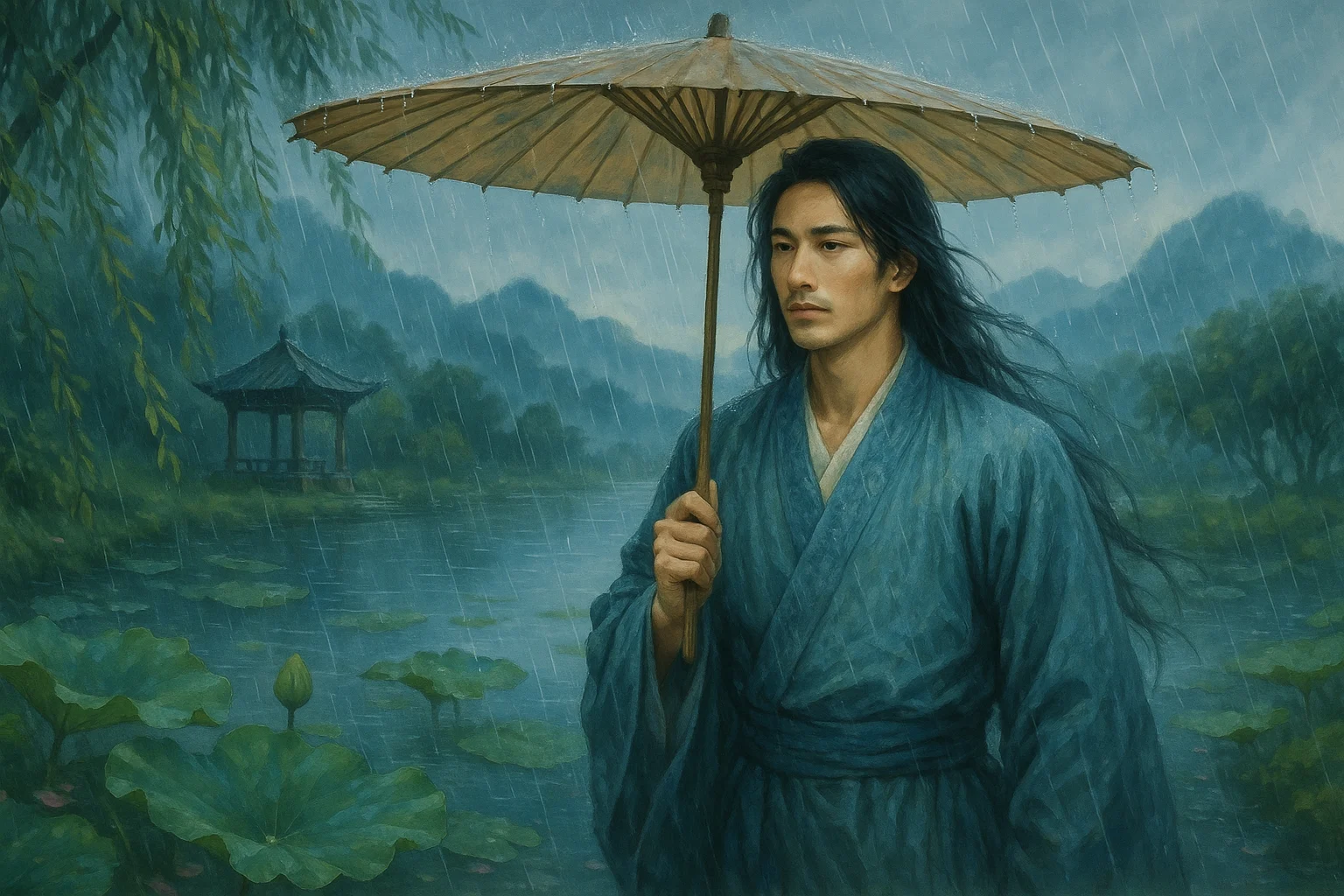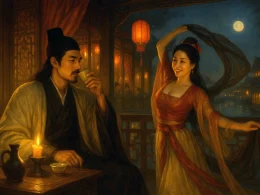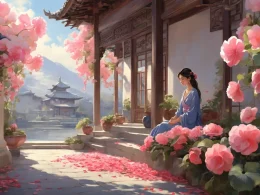In dreams I trod where Changan's roads unfold,
Through spring's green tapestry, rich and bold.
Now waking finds spring's vanished gold,
A tranquil pond its story told.
Original Poem
「梦」
吕本中
梦入长安道,萋萋尽春草。
觉来春已去,一片池塘好。
Interpretation
This compact poem, penned during Lü Benzhong's twilight years amidst the Southern Song's fractured reign, distills a lifetime of displacement into twenty characters. Through the fleeting vision of Chang'an—the fallen Northern Song's symbolic heart—and the austere beauty of a post-dream pond, the poem traces the trajectory from illusory hope to quiet resignation. The juxtaposition of lush dream-grass and stark wakeful waters mirrors the poet's journey from political yearning to hard-won serenity.
First Couplet: "梦入长安道,萋萋尽春草。"
Mèng rù Cháng'ān dào, qīqī jìn chūn cǎo.
I dreamt myself on Chang'an's thoroughfare—
spring grasses lush to every side.
The couplet opens with a potent political mirage. "Chang'an's thoroughfare" (长安道), though referencing the Tang capital, here stands for Kaifeng—the Northern Song's lost capital. Its appearance in dreams underscores its unreachability. The "lush spring grasses" (萋萋春草), while verdant, carry the classical connotations of the Chuci tradition: unchecked growth symbolizing both vitality and the obscuring of paths home.
Second Couplet: "觉来春已去,一片池塘好。"
Jué lái chūn yǐ qù, yī piàn chí táng hǎo.
Awake, I find spring spent—
only this pond's flawless stillness remains.
The transition from dream to reality is stark. "Spring spent" (春已去) operates on three levels: seasonal change, the Southern Song's diminished territory, and the poet's own advanced age. The "flawless stillness" (好) of the pond, far from being mere scenery, becomes a meditative focus—an invitation to accept the present's pared-down beauty after grand illusions fade.
Holistic Appreciation
Though brief, this work creates a powerful emotional contrast through the juxtaposition of dream and reality. The opening line—"Dreaming, I entered Chang’an’s roads"—instantly transports readers to a world brimming with hope and vitality. "Lush spring grasses stretched endlessly" paints a scene of abundant beauty with vivid colors and scents, yet the word "lush" (萋萋) carries profound cultural duality: it evokes the vibrant vitality from the Classic of Poetry while also hinting at parting sorrow and decline, offering a layered emotional experience.
Transitioning to reality, the line "Awakening, spring had fled" delivers a poignant sense of impermanence, echoing the swift passage of time and the fragility of life. The closing phrase "a serene pond lay before me" resolves the emotion in tranquil imagery—both an acceptance of reality through nature’s solace and a return to simplicity after life’s turbulence. The emotional arc—from fervor to stillness, anticipation to peace—mirrors the introspective trajectory characteristic of Lü Benzhong’s later poetry.
Artistic Features
- Dream-Reality Contrast
Shifting between dreamscapes and waking life amplifies emotional tension, heightening the poem’s impact. - Symbolic Imagery with Grass
"Lush spring grasses" symbolize both vitality and hidden sorrow, blending richness with subtlety. - Simplicity with Profound Space
Four lines suffice to ignite expansive imagination in the reader’s mind. - Scene-Emotion Fusion, Ethereal Realm
Nature and human reflection intertwine, embodying the Song literati’s unique aesthetic of tranquil elegance.
Insights
This poem urges us to cherish fleeting moments of beauty. Life is as ephemeral as a dream; splendor like Chang’an vanishes in a blink. Only inner calm and appreciation of nature endure as timeless virtues. The poet clings to ideals in dreams and finds solace in wakeful observation, teaching us: even when spring fades, serenity and joy can still be found in "a serene pond." Such mindfulness is especially valuable in our fast-paced modern world.
About the Poet

Lü Benzhong (吕本中 1084 - 1145), a native of Shouxian in Anhui, was a renowned poet and Neo-Confucian scholar of the Southern Song Dynasty. As a key theorist of the Jiangxi Poetry School, he proposed the concept of "living method" (huofa), advocating for natural variation within established poetic rules. With over 1,270 surviving poems, his Genealogy of the Jiangxi Poetry School (Jiangxi Shishe Zongpai Tu) established Huang Tingjian as the school's patriarch, profoundly influencing Song poetic theory and serving as a bridge between the Jiangxi School and the Four Masters of the Mid-Song Revival.












